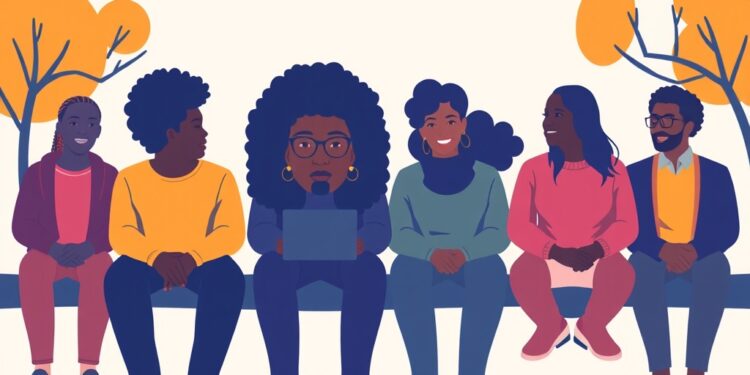
In a groundbreaking report released this week, researchers from the University of Michigan School of Public Health have shed light on the mental health outcomes of Black students attending Historically Black Colleges and Universities (HBCUs) and Predominantly Black Institutions (PBIs). This study underscores the multifaceted experiences these students encounter, revealing a dual narrative of success and struggle in mental well-being. The research presents a fascinating juxtaposition, highlighting not only the protective factors contributing to better mental health outcomes but also the serious challenges that demand urgent attention from educators and policymakers.
The report, titled “Community, Culture, and Care: A Cross-Institutional Analysis of Mental Health Among HBCU and PBI Students,” was developed in collaboration with esteemed organizations such as the United Negro College Fund Institute for Capacity Building, the Steve Fund, and the Healthy Minds Network. Drawing from the extensive Healthy Minds Study, which has engaged over 850,000 college students from more than 600 institutions since its inception in 2007, the researchers sought to amplify the voices of Black students in discussions around mental health and academic life.
A particularly striking finding of this research is the mental health metrics of HBCU and PBI students, which surpass the national averages in several key areas. For instance, 45% of participants reported “flourishing” mentally, eclipsing the national average of 36% for all college students. This statistic speaks volumes about the resilience and fortitude among these students, suggesting that HBCUs and PBIs provide a nurturing environment that fosters mental and emotional well-being. Furthermore, the study indicates that 83% of respondents felt a sense of belonging within their campus community, a critical factor that has been linked to enhanced mental health outcomes.
However, the report does not shy away from addressing the stark realities many Black students face. Financial stress emerged as the leading concern among participants, with over half indicating that their financial situation was a constant source of anxiety. The ramifications of financial insecurity are profound; the data reveals a staggering 78% of students grappling with financial distress reported experiencing mental health problems. In contrast, only 26% of those who felt financially stable reported similar issues. This correlation underscores the urgent need for institutions to address financial barriers that impede students’ academic and mental health.
The research further uncovers a concerning gap in access to mental health resources among HBCU students. An alarming 54% of respondents reported unmet mental health needs, significantly higher than the national average of 41%. This gap presents a critical area for intervention and suggests that while students may experience relatively positive mental health outcomes, many still lack the necessary support systems to navigate their unique challenges. Such disparities call for immediate action to ensure that mental health services are not only available but also accessible and tailored to meet the needs of Black students.
Moreover, the report presents comparative data that showcases the mental health of Black students at predominantly white institutions, suggesting that HBCUs and PBIs generally furnish a more supportive environment. The findings challenge the prevailing narrative surrounding Black students’ mental health and emphasize the need for nuanced approaches that are sensitive to the historical and contextual factors influencing their experiences.
Building on the insights garnered from this research, the authors suggest several actionable strategies for colleges and universities aiming to bolster student support. Addressing the high rate of unmet mental health needs should be a priority, as well as developing comprehensive strategies to alleviate financial stress. The expansion of on-campus mental health resources and the strengthening of relationships between students and faculty can create a more supportive atmosphere conducive to overall well-being.
Co-principal investigator Justin Heinze emphasizes the importance of recognizing that the voices and experiences of Black students have been historically marginalized in mental health research. As the findings illustrate critical differences between HBCU students and their peers nationally, it becomes evident that a “one size fits all” approach to mental health care is ineffective. Tailoring resources and support systems to meet the unique needs of diverse student populations is paramount for fostering an environment where all students can thrive.
In summary, the insights gleaned from this report not only highlight the accomplishments of HBCU and PBI students in terms of mental health but also serve as a pivotal call to action for institutions to reshape their approaches to student support. By focusing on the specific experiences and challenges faced by Black students, universities can foster a more inclusive and supportive environment, ultimately leading to enhanced outcomes in mental health and academic success.
This study represents a significant step forward in understanding the complexities of mental health amongst Black college students, providing a crucial framework for future research and intervention strategies. Acknowledging and addressing the challenges while celebrating the strengths of these students provides a more holistic view that is essential for cultivating future generations of scholars and leaders.
The work conducted by the team provides a vital perspective on the mental health landscape of Black college students and reiterates that ongoing dialogue and actionable change are paramount in addressing their needs. Moving forward, institutions must commit to creating equitable environments that truly support the well-being of all students, recognizing that their success is inextricably linked to their mental health and institutional support.
Subject of Research: Mental Health Outcomes among HBCU and PBI Students
Article Title: Community, Culture, and Care: A Cross-Institutional Analysis of Mental Health Among HBCU and PBI Students
News Publication Date: October 2023
Web References: https://uncficb.org/wp-content/uploads/2025/03/healthymindstudycommunitycultureandcare.pdf
References: N/A
Image Credits: N/A
Keywords: Mental health, Public health, HBCUs, PBIs, Student support, Financial stress, Mental health resources
Tags: academic life and mental healthBlack students mental well-beingchallenges in Black student mental healthcommunity support for HBCU studentscross-institutional mental health analysisHBCU student mental health outcomesHealthy Minds Study findingsHistorically Black Colleges and Universities researchmental health advocacy in higher educationmental health disparities in educationmental health protective factors for Black studentsUniversity of Michigan School of Public Health study





